Sprouting tips
✍ 1 May 2023
Sprouting and fermenting are the healthiest and most economical way to prepare seeds! Here are tipps for buckwheat, chickpeas, lentils, linseeds, sesame and sunflower seeds. We also discuss if they are good to eat raw...
Keep the dry seeds in the dark. With light, the seeds become brown and less able to sprout. Soak 20 - 30 minutes - longer only if the seeds are very fresh (green) and it's not too hot. Otherwise the slimy soaking water tends to ferment. Let it sprout covered (like with a plate over it, not a towel) and usually no need to rinse. If it's not too hot it will keep for a week or so. We often make a larger batch of buckwheat sprouts and then dry them in the sun. Then they keep longer and taste good. Frequent rinsing is usually recommended, but I find my method better. And you can also find it in German at:
More about buckwheat sprouts
Soak - minimum 12 hours - the ideal though is 4 days in the fridge - changing the water once a day. Then drain, and sprout (not required) for maximum 12 hours - sprouting more makes a more "beany" flavor. You can get rid of this flavor and make the beans softer like steaming by simply freezing the soaked seeds and defrosting. Serve with some lemon juice, natural salt and ground cummin.. garlic.. parsley/cilantro. Super-blend to cream with soaked sesame and get super-hummus spread. See below about possible problems.
More about chickpea sprouts
Soak - minimum 12 hours, ideally 2 days changing the water each day
if you desire a sprout - best to just have a little tail and the flavor will be less "beany". Rinse once a day. Freeze and defrost if you want it nice and soft - just like steaming. See below about possible problems.
More about lentil sprouts
Just soak - they are difficult to sprout and less tasty. They become slimy and an excellent binder for sun-crackers. Flaxseed and flaxseed oil are considered valuable for health because of their high omega-3 content. However, it is recommended to eat no more than two tablespoons of flaxseed per day because of its hydrocyanic acid and cadmium content. The brown linseeds are better known, they have more Omega 3 fatty acids, but also more Cadmium and hydrocyanic acid. Thus I gues we can eat more of the golden linseeds. Here I found a method for sprouting them:
More about linseed sprouts
Soak for 2 days in a cold place, change water once a day, don't sprout - they become bitter. It could be a question of the quality of the seeds, as can be read in some websites:
More about sesame sprouts
Soak for a few hours. Rinse once a day. Eat them within 2 days. I don't like the older sunflower sprouts. Perhaps the reason is that not all sunflower seeds germinate. You can't eat them all? We mix them with some vegetables (like pepper, tomotoes, cucumbers) and spices and put the creme in a glass. Then we have 2 or 3 days more to eat them. The fermentation makes it even more digestible and we like the slightly sour taste. See photo below! If you also have soaked flaxseeds, you can mix them in, spread them out on parchment paper (or banana leaves) and dry in the sun. Or simply dry the sprouts in the sun.
More about sunflower sprouts
Risks:
When you are in a poor health, it's a good idea to start eating raw sprouts. But it's better to start cautiously, especially raw chickpea sprouts, lentil sprouts and other legumes. If you eat them in large quantities, they can lead to symptoms of poisoning such as feeling unwell or vomiting two hours after consumption. Lectins such as phasin are considered to be the cause, as well as bacterias like salmonellas. The sprouting of the seeds reduces the lectins, but does not completely eliminate them. People also have different sensitivities to lectins. I have sometimes eaten the sprouts in larger quantities and felt no symptoms, neither several of my friends. Possibly a high raw food diet reduces sensitivity to lectins. For further reading:
► Wikipedia about Phytohaemagglutinin in raw legumes
►
Warning by a German authority
► Statement for raw sprouts
PS Ishmaelle wrote me: I made raw hummus for many people many times, huge amounts - I never heard of any of the symptoms. I ususally do soak them for several days though! And they do ferment a little (especially the outer skin I assume) and maybe the fermentation reduces the toxins: https://www.tandfonline.com/doi/pdf/10.1080/09540100220137655
23 May - Ishmaelle researched more: Hey meenhard - continuing about lectins - from what i am reading it looks like the warnings are mostly unfounded - and new research actually sees benefits in consuming lectins.
https://www.todaysdietitian.com/newarchives/1017p10.shtml
Although the scientific literature raises theoretical concerns about the potential toxicity of lectin, research also suggests lectin provides health benefits with regard to GI metabolism and cancer prevention. A 2016 article published in Current Protein & Peptide Science reviewed the anticancer activity seen in mushrooms in vitro and in vivo.2 Researchers concluded that lectin may have a possible role in the treatment of cancer and even could be used in antitumor drugs in the future. A study in 1993 published in the European Journal of Clinical Nutrition discussed the possible benefit of lectin to gut health, specifically due to the fact it isn't digested and can be transported across the gut wall.3 The study examined animal trials, however, and research is limited in humans.
We ate some fresh purple beans right off the vine today.. and in the past we ate Thai Lubia (very long) and i doubt very much that something that is SO naturally delicious would cause damage. of course when you eat unnatural amounts of anything - damage will be done - but this is true on all foods - and when only raw plant foods are tagged with scarry warnings in mostly serves that default culture with its emphasis on cooked/processed/animal-sources.
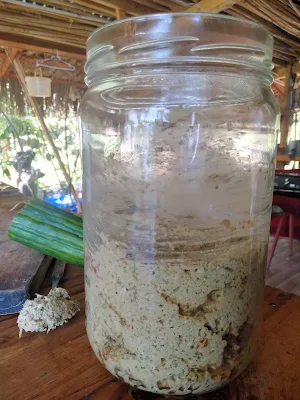
Fermentation of sprouted sunflower seeds, vegetables, wild plants and garlic leaves
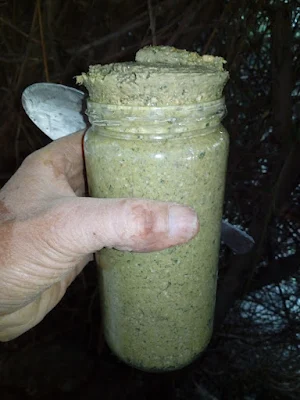
Don't fill the glass too much - the fermentation is growing!

Buckwheat sprouts, drying on a tray in the sun. They are already brown - it's time to bring them home.

You don't need to buy equipment for germination. Restaurants and snack bars often throw away such buckets. We have drilled small holes in the bottom and hang the bucket with the sprouts.


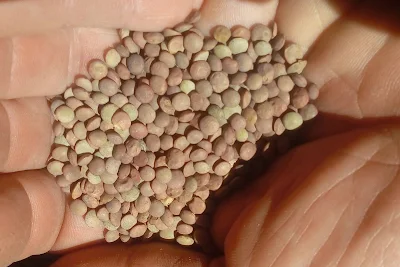
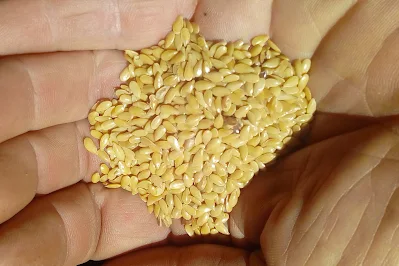

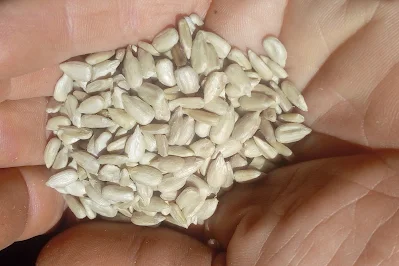

Comments